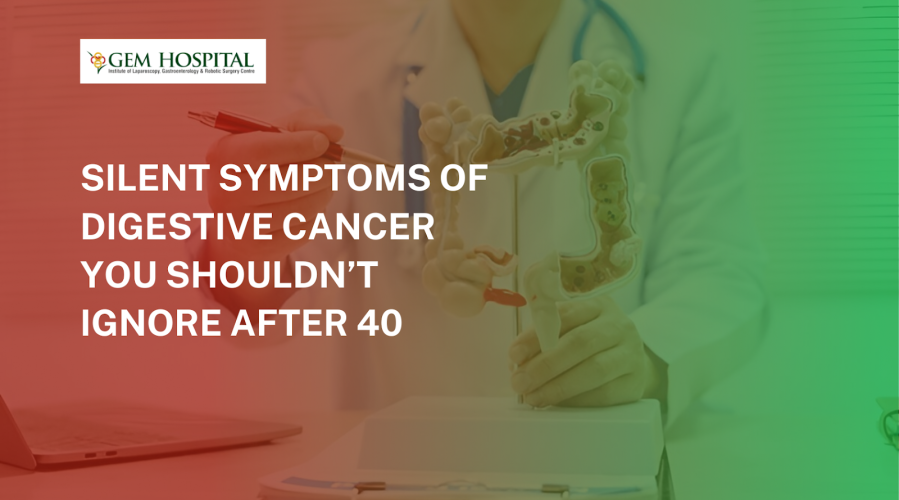Consult experienced hernia doctors in Chennai for expert surgical care. Advanced diagnosis, safe hernia surgery, and faster recovery with specialized treatment.
Silent Symptoms of Digestive Cancer You Shouldn’t Ignore After 40

Digestive cancers often sneak in. They do not often shout at us to pay attention in the early stages like some conditions do. For the over-40 crowd, however, if you can identify the early signs of digestive cancer, it could save your life. This blog will explore some of the more subtle, quiet signs that might indicate something more serious, and why you should never ignore these signs.
1. Unexplained Weight Loss
An unexplained weight loss can seem like a dream come true, but if you are over 40, it can be a sign of something wrong. Digestive cancers, namely the stomach, pancreas, or colon can restrict you from absorbing nutrients, or if the tumor is active, your metabolism can be impacted and therefore result in weight loss.
What to watch for:
- Sudden drop in weight (more than 5 kg within a few months)
- No change in diet or physical activity
2. Persistent Abdominal Discomfort
Bloating, fullness, or mild abdominal pain that won’t go away can be easy to dismiss. But these subtle discomforts may signal tumors interfering with digestion.
Pay attention if:
- Pain is dull but chronic
- There's consistent bloating even after light meals
3. Changes in Bowel Habits
One of the most common yet ignored digestive cancer signs is a change in bowel movements. This includes:
- Ongoing constipation or diarrhea
- Narrow stools
- A feeling that your bowel doesn't empty completely
Especially if these symptoms persist for weeks, it’s time to investigate further.
4. Fatigue or Weakness
Digestive cancers can lead to internal bleeding or poor nutrient absorption, both of which can make you feel tired all the time.
You may feel:
- Weak without physical exertion
- Mentally foggy or lethargic during the day
- Easily winded with simple tasks
5. Blood in Stool or Vomit
Sometimes the signs are silent, but other times they show up subtly like a small amount of blood in the stool or vomit. This could be mistaken for piles or ulcers but should never be ignored, especially in people over 40.
6. Persistent Indigestion or Heartburn
Continue to experience indigestion, reflux, dyspepsia, or a burning stomach after eating – it could indicate esophageal or stomach cancer. You may have experienced indications after specific foods, however, if it had persisted without improvement or even with medication, we would recommend seeking further screening.
7. Feeling Full Too Soon While Eating
You are losing weight, but still eating less, and are now feeling full after small amounts, because of the capacity of your stomach and reduced function because of the tumor. We often hear this from patients diagnosed with gastric cancer.
8. Jaundice or Yellowing of Skin/Eyes
You may have jaundice if a tumor in your bile duct or pancreas have blocked the normal flow of bile. Jaundice often starts with the patient noticing yellowish eyes, darker urine, or paler stools but it is a significant indicator that may suggest something is wrong deep within your digestive system.
When Should You Take Action?
If you’re over 40 and have one or more of these symptoms that won't resolve, you should be evaluated. The earlier digestive cancer is detected, the more we can improve treatment outcomes.
Trust the Experts at GEM Hospital
GEM Hospital is focused on early detection and treatment of gastrointestinal cancers. We can address your health issues with leading diagnostic modalities, advanced minimally invasive treatments, and our specialized gastro-oncologists to help guide you from concern to cure.
Don't ignore the symptoms, schedule your digestive health assessment today.
Schedule an appointment and begin your journey to clarity and care.
Blogs & Article
Get advanced liver transplant treatment in Chennai with expert surgeons, modern technology, and comprehensive care for safe and successful outcomes.
Get advanced piles treatment in Erode with expert doctors. Safe procedures, modern technology, and effective care for fast relief and recovery.


